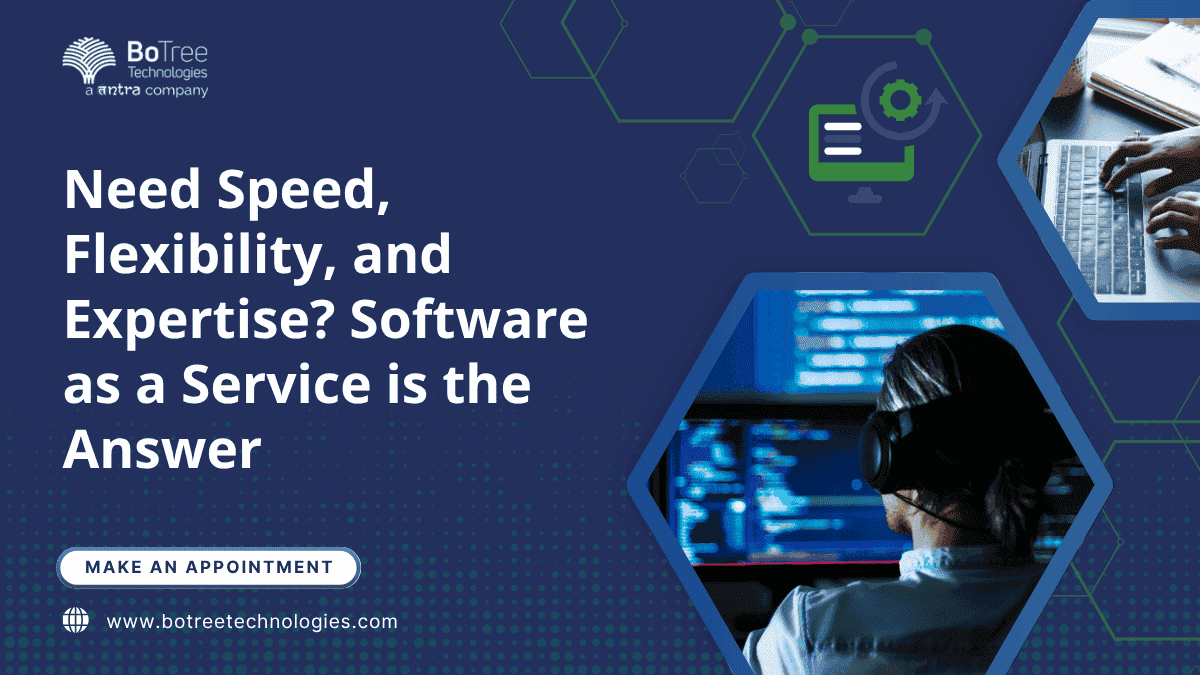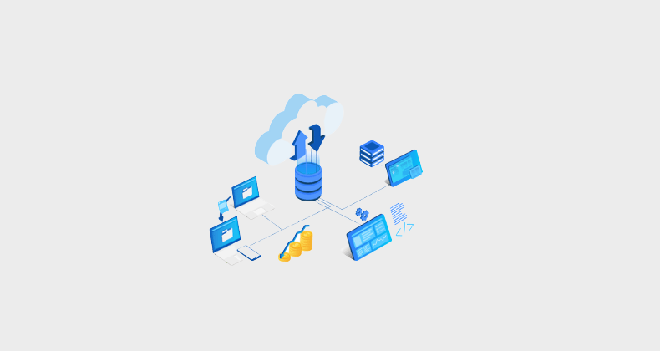
Need Speed, Flexibility, and Expertise? Software as a Service Is the Answer
Healthcare organizations need timely, compliant IT services. This article shows how Software as a Service (SaaS) platforms speed deployments, lower costs, and ensure compliance. With cloud-based software and native Salesforce integration, teams enjoy real-time data sync, automated workflows, and security. Custom SaaS application development and SaaS integration services connect EHRs, billing systems, and telehealth tools. Decision makers gain criteria for selecting software as a service companies, insights into software as a service trends, and a roadmap to future-proof patient care. Continue reading to learn more.
In healthcare, timing is everything between recuperation and relapse. You just need a technology that rolls out new features as you adopt new treatment protocols. Software as a service makes this possible by providing you on-demand access to legacy applications without the burden of installing them in the traditional manner. When you choose software as a service platform, you do not merely buy speed; you also get flexibility to adjust capacity up or down-right what every busy decision-maker in healthcare needs to stay ahead of patient needs and regulatory requirements.
Organizations have invested millions in custom builds only for maintenance to drain their cash and for new features to be delivered in well over a year. By contrast, SaaS companies put out updates and deal with security and compliance, freeing your IT team up to work on strategic initiatives. And with Salesforce sitting at the core of our patient engagement agenda, the ideal SaaS integration services partner must understand both healthcare workflows and all the intricacies of cloud-based CRM.
Why Software as a Service Matters for Healthcare Decision Makers
To understand what is Software as a Service (SaaS), think of it as renting fully managed software over the internet. Instead of buying licenses, you subscribe. That shift has profound implications:
- Upfront cost control: You replace large capital expenditures with predictable operating expenses.
- Rapid deployment: Implement in weeks, not months, so new features for telehealth or electronic health records go live almost immediately.
- Continuous compliance: Leverage software as a service companies that have embedded HIPAA, GDPR, and local data-residency controls into their platforms.
For healthcare executives, these factors translate into faster time-to-value. You’re not waiting for hardware racks to arrive or patches to be tested. Instead, your teams can pilot new patient outreach programs, streamline claims processing, and refine care pathways without the typical project delays.
Accelerate with Cloud-Based Software and SaaS Solutions
Leveraging cloud-based software means your organization can stretch beyond hospital walls while keeping data secure. Here’s how SaaS solutions power this transformation:
- Global accessibility: Physicians, nurses, and administrators access the same data from any device, anywhere.
- Elastic scalability: Increase capacity during flu season or scale back after a campaign – your subscription adjusts accordingly.
- Resilience and uptime: Leading SaaS platform providers guarantee 99.9% availability, critical for life-or-death environments.
As you explore Saas software as a service options, look for modules built specifically for healthcare – scheduling, patient portals, telemedicine, billing, and analytics. These integrated tools mean you avoid stitching together disparate systems, reducing friction and potential data inconsistencies.
Choosing a SaaS Platform for Seamless Salesforce Integration
When Salesforce drives your patient relationship management, a software as a service platform that integrates natively can revolutionize workflows:
- Real-time data sync: No more batch updates. Lab results, insurance authorizations, and care-plan changes reflect instantly in Salesforce.
- Automated workflows: Trigger appointment reminders, care-gap outreach, or referral follow-ups without manual intervention.
- Extended ecosystem: Add third-party compliance scanners or AI-driven risk-scoring models via managed packages.
This integration software as a service approach reduces custom code and maintenance burdens. Instead of wrestling with APIs, you gain access to pre-built connectors and a partner experienced in SaaS integration services tailored for healthcare.
Leveraging Enterprise SaaS Solutions and Custom SaaS Application Development
Large health systems have intricate requirements – multi-entity billing, advanced security policies, and granular reporting. That’s where enterprise SaaS solutions shine:
- Configurable security: Role-based access, data encryption at rest and in transit, and audit logs built into the platform.
- Multi-entity support: Consolidate reporting across hospitals, clinics, and home-care divisions within a single subscription.
- Performance guarantees: SLAs backed by financially accountable uptime commitments.
Yet even the most comprehensive SaaS solutions sometimes need a custom touch. Custom SaaS application development bridges gaps:
- We can build patient onboarding portals with your branding, or tailor dashboards that align with your clinical quality metrics.
- When off-the-shelf modules don’t cover a specialized tele-rehabilitation workflow, SaaS development services come into play, delivering targeted enhancements without derailing your roadmap.
Partnering with a software development services provider that offers both software development as a service and managed upgrades ensures that your customizations stay current as the core platform evolves.
Powering Growth with SaaS Integration Services and SaaS Development Services
Your healthcare ecosystem likely spans electronic health records, imaging archives, pharmacy systems, and financial engines. Orchestrating data flow across these applications is where SaaS integration services and SaaS development services deliver enormous ROI:
- API orchestration: Centralize thousands of daily transactions – patient check-ins, lab orders, prescription renewals – through a unified integration layer.
- Data normalization: Map disparate data fields into a single patient profile, reducing chart reconciliation time and manual errors.
- Event-driven automation: Configure triggers so that a new admission record can automatically initiate discharge planning workflows in Salesforce.
Meanwhile, when you need new digital experiences – mobile care coordination apps or AI-driven patient triage – software development company partners skilled in software development services ensure rapid delivery. A true software as a service company will combine integration expertise with development craftsmanship, helping you launch innovative services without ballooning your internal headcount.
Selecting the Right Software as a Service Company and Software Development Services Provider
Not all providers are created equal. To find the optimal software-as-a-service and development partner:
| Selection Criteria | What to Evaluate |
| Domain expertise | Experience with healthcare regulations and workflows |
| Technical stack alignment | Compatibility with Salesforce, AWS, Azure, etc. |
| Support and governance | 24/7 service desk, dedicated account management |
| Innovation roadmap | Frequency of feature releases and user-driven enhancements |
| Total cost of ownership | Transparent pricing, predictable renewal terms |
Choosing a professional software development company that also provides enterprise SaaS solutions means you avoid vendor fragmentation. Look for firms with proven track records in custom SaaS application development, where they’ve successfully combined off-the-shelf modules with bespoke features.
Future-Proofing Your Organization: Software as a Service Trends
To stay competitive, keep an eye on emerging software as a service trends reshaping healthcare:
- AI-first applications: From predictive patient risk scoring to automated documentation, AI-driven SaaS modules are becoming mainstream.
- Low-code/No-code platforms: Empower clinical teams to prototype new processes – like custom referral approvals – without waiting for IT backlogs.
- Edge analytics integration: Wearables and IoT devices feed real-time vital signs directly into your cloud-based software, enabling proactive interventions.
- Blockchain for integrity: Immutable audit trails for consent forms, prescription histories, and device logs enhance compliance and trust.
- Outcome-based pricing: Innovative software as a service companies are shifting from pure subscriptions to value-based contracts aligned with patient outcomes.
By embracing these shifts, you’ll ensure your Salesforce-driven workflows and broader IT ecosystem remain agile, secure, and ready for the next wave of digital innovation.
Conclusion: Software as a Service Delivers Speed, Flexibility, and Expertise
Healthcare organizations face unprecedented pressure to optimize costs, improve patient outcomes, and innovate at the speed of light. Software as a Service (SaaS) responds by providing SaaS solutions that can be instantly deployed, elastically scaled, and evolved on-demand. Be it for a SaaS platform tightly integrated with Salesforce, for SaaS integration services, or custom SaaS application development through a software development services provider- the bottom line is a strategic advantage for you.
When considering SaaS companies, focus on those combining domain expertise with solid software development as a service practice. This ensures that your transformation to the cloud is not a mere technology upgrade but instead a force for better patient care. When you want an answer with speed, flexibility, and healthcare expertise in depth, the answer is Software as a Service.
FAQs
What are the main benefits of using SaaS?
SaaS eliminates heavy upfront costs by shifting to a predictable subscription model, freeing capital for patient care. It accelerates deployment – new features roll out in days, not months – and ensures automatic updates and compliance.
How does SaaS differ from traditional software?
Traditional software requires on-premises installation, manual upgrades, and hardware management. SaaS delivers cloud-hosted applications accessed via browser, with the provider handling infrastructure, maintenance, and security.
What should I consider when choosing a SaaS provider?
Evaluate industry expertise, especially in healthcare regulations like HIPAA and GDPR. Review scalability, integration capabilities (e.g., Salesforce connectors), support SLAs, and transparent pricing structures.
Can SaaS solutions be customized for specific business needs?
Yes. Many providers offer modular add-ons and low-code tools for tailoring workflows, dashboards, and user interfaces. For deeper requirements, custom SaaS application development can extend core functionality without disrupting upgrades.
What are the security implications of using SaaS?
Reputable SaaS platforms employ end-to-end encryption, role-based access controls, and continuous vulnerability monitoring. However, you must verify the provider’s compliance certifications, data residency options, and incident-response processes.




